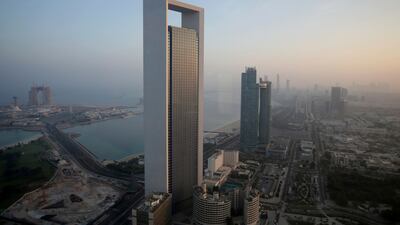Adnoc and US oil and gas company Occidental Petroleum have signed an agreement to evaluate investment opportunities in carbon capture and storage (CCS) in the UAE and the US.
The state-run energy company and Occidental are partnering “with a view to develop a carbon management platform to accelerate the net-zero goals of both companies”, Adnoc said on Tuesday.
The agreement is part of the US-UAE Partnership for Accelerating Clean Energy (Pace), a $100 billion partnership between the two countries announced last year.
“The world is going to need a host of technologies, including direct air capture [DAC] and CCUS, to meet our global climate objectives,” said Amos Hochstein, senior adviser to the president for energy and investment at the White House.
“This important announcement is a great example of what the US-UAE Pace can help enable. I look forward to what this agreement yields.”
As part of the agreement, Adnoc and Occidental are evaluating the development of DAC facilities in the UAE, including what could be the first mega-tonne DAC project constructed outside of the US, the company said.
The companies will also assess the joint development of one or more carbon management centres in the UAE.
They would be offer carbon capture services and provide the infrastructure to safely transport carbon dioxide from the UAE’s carbon-intensive and hard-to-abate sectors and permanently store it in rock.
Adnoc will also explore its participation in a number of DAC and carbon-dioxide sequestration hubs in the US that are being developed by an Occidental subsidiary.
“We look forward to building on our long-standing partnership with Adnoc as we advance our plans to globally deploy DAC technology and engage partners who are committed to developing carbon solutions at climate-relevant scale,” said Vicki Hollub, president and chief executive at Occidental.
“Partnerships like this one are essential to helping the world reach its climate goals and ensure it has the resources it needs to thrive through the energy transition.”
Adnoc on Monday revised its plans to reach net-zero emissions by 2045, from a target of 2050. The company also aims to achieve zero methane emissions by the end of the decade.
The company has allocated $15 billion to invest in projects up to 2030, which will help its low-carbon growth strategy.
These projects include clean power, carbon capture and storage, further electrification of operations, energy efficiency and new measures to build on its policy of zero routine gas flaring.
“This agreement highlights how the UAE-US Pace is driving innovative climate technologies to decarbonise the energy sector,” said Musabbeh Al Kaabi, executive director of low carbon solutions and international growth at Adnoc.
“The need to significantly reduce carbon emissions to address climate change is clear and urgent and carbon capture is an important technology that can be scaled up to decarbonise across all industries.”
The UAE is investing heavily in clean energy projects and has announced several initiatives as it seeks to reach net-zero emissions by 2050.
The country is developing clean energy projects such as the Barakah nuclear plant, a two-gigawatt solar plant in Abu Dhabi's Al Dhafra region and the five-gigawatt Mohammed bin Rashid Al Maktoum Solar Park in Dubai.
This month, the Cabinet also approved an updated version of the UAE Energy Strategy 2050 and the development of the National Hydrogen Strategy.
Under the updated objectives of the UAE Energy Strategy 2050, the Arab world’s second-largest economy will invest Dh200 billion ($54 billion) by 2030 to ensure energy demand is met while sustaining economic growth.
The UAE aims to produce 1.4 million metric tonnes of hydrogen annually by 2031 and 15 million metric tonnes every year by 2050.

